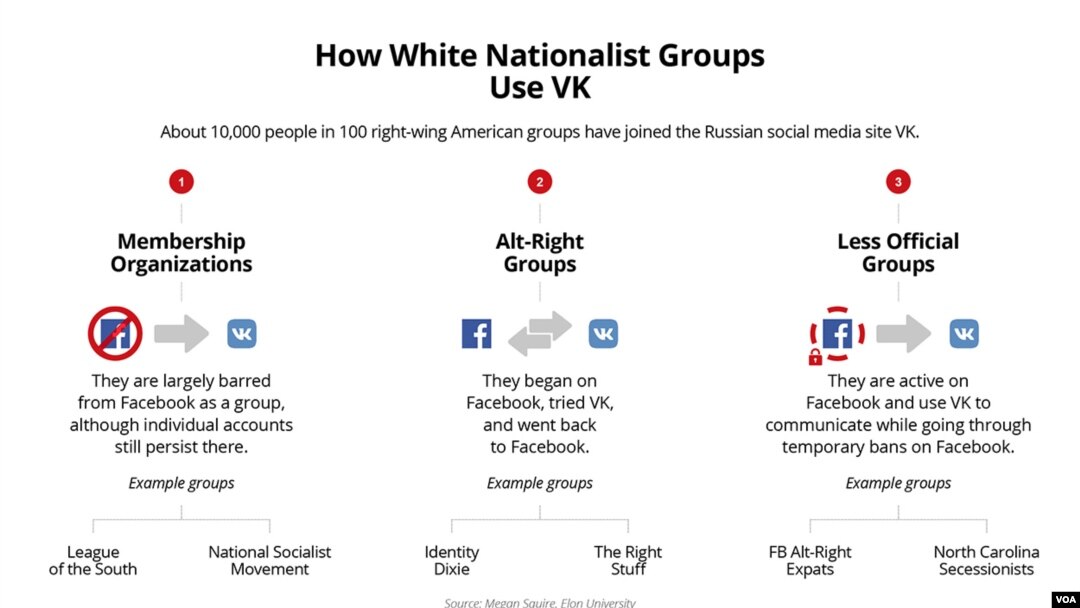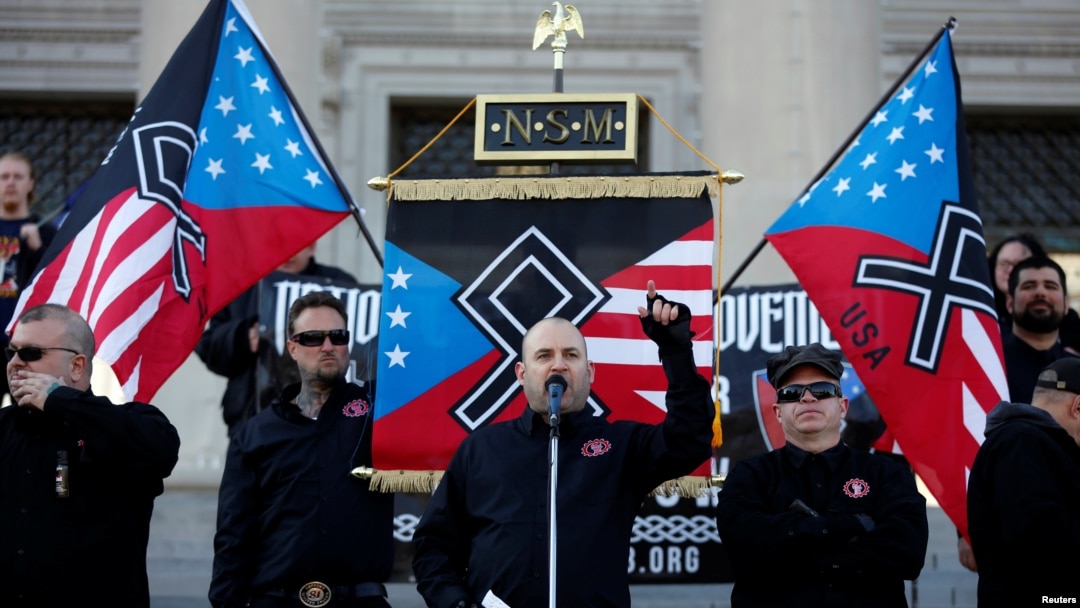Ihar Tsikhanenka contributed to this report
WASHINGTON — Last month, Jeff Schoep, the self-styled commander of one of the largest neo-Nazi groups in the United States, took to VKontakte, Russia's version of Facebook, to update his followers about a brewing scandal.
Schoep's group, the National Socialist Movement, was outraged over his bizarre decision to hand over the reins to a black civil rights activist, and Schoep wanted to set the record straight.
Addressing "Fellow Patriots of the National Socialist Movement," Schoep wrote in a March 2 post that he had been "deceived" by James Stern who had persuaded him to sign over NSM's presidency to him in order to shield the group from a lawsuit. Schoep reassigned control to his chief of staff, Burt Colucci.

VK welcomes provocative, racially offensive posts
Schoep chose VKontakte, or VK, for a reason: Russia's free-for-all Facebook clone is the only major social media platform that still welcomes people like him to post pretty much anything they want — no matter how racially offensive or provocative — with relative impunity.
With U.S. social media companies tightening their content policies in the wake of the recent mosque shootings in New Zealand, some extremist groups are getting pushed to the margins of the internet.
That, researchers say, could turn VK into a safe harbor for an ever greater number of white nationalists seeking to communicate with one another and get their messages out.
“The best thing about VK is it’s not going to throw you off for saying terrible things about Jews or African Americans and so on,” said Heidi Beirich, director of intelligence at the Southern Poverty Law Center, tongue in cheek.
Your browser doesn’t support HTML5
US White Nationalists Barred by Facebook Find Haven on Russia Site
In recent years, as social media companies have curbed extremist content on their platforms, tech-savvy white nationalists have turned to alternative sites to communicate, organize and recruit members.
While some have been pushed into the internet's dark underbelly, others have gravitated to websites that still allow extremist content under the guise of free speech.
For Twitter users, Gab, a "free speech" Twitter clone, has emerged as an alternative. For white nationalists banned from Facebook, VK, based in St. Petersburg, has become a favorite destination. Its laissez faire policy allows them to post hate-filled memes, praise Hitler, rail at immigrants and Jews, and doxx — publish private information about their enemies.
People hold placards during a protest against a ban of Russian social networks Vkontakte by the Ukrainian government, in Kiev, Ukraine, May 19, 2017.
100 right-wing American groups on VK
Megan Squire, a computer scientist at Elon University in North Carolina, has collected data on about 100 right-wing American groups and 10,000 members on VK. They range from the older skinheads and neo-Nazis to the younger, more modern ethno-nationalists collectively known as the alt-right, short for alternative right.
Many alt-right followers joined VK after they were barred from Facebook in the wake of the 2017 right-wing white nationalist rally in Charlottesville, Va.
While some have since left VK, the Russian platform's attractiveness as a meeting ground for right-wing extremists is likely to grow after Facebook announced last month it would prohibit content that promotes white nationalism and separatism.
"I don't think there is any question activity will pick up on VK," Beirich said.
FILE- The logo for Facebook appears on screens at the Nasdaq MarketSite in New York's Times Square, In this March 29, 2018 photo.
Hate groups view themselves as civil rights' organizations
Labeled as hate groups by the SPLC, extremist white nationalist groups see themselves as civil rights organizations and say Facebook's new policy will only encourage members to look for alternative platforms such as VK.
"Institutions like Facebook … have extremely strict laws as far as what you can and can't say on there," Colucci said in an interview.
"So consequently, as an American, even though we have our constitutional rights, we have to go to a Russian network such as VK to be able to express it."
Founded in 2006, two years after Facebook, VK has grown into Russia's largest social media platform with an estimated 500 million users.
Then, Charlottesville happened.
In August 2017, far-right groups, including Colucci's, descended on the southern U.S. college town to protest the planned removal of a Confederate general's statue.
A 32-year-old woman was killed, and 28 people were injured after a white supremacist drove a car into a crowd of counterprotesters.
FILE - In this Aug. 12, 2017, photo, rescue personnel help injured people who were hit when a car ran into a large group of protesters after a white nationalist rally in Charlottesville, Va.
Charlottesville conflict a turning point
The violence outraged the nation, especially after President Donald Trump insisted there were "very fine people on both sides" of the rally.
News reports that the organizers had used social media platforms and other websites to organize and raise funds led to public pressure on internet companies to act.
In the days that followed, Facebook, Twitter and others suspended or otherwise removed dozens of accounts belonging to right-wing groups and individuals involved in the rally.
That drove many white nationalists to VK. A new VK group called "FB Alt-Right Expats" was created. Two weeks after Charlottesville, the leader of an alt-right group wrote on his brand-new VK page: "Good bye Zucc," referring to Facebook founder Mark Zuckerberg.
VK's terms of service prohibit users from "calls for war, aggression, as well as national and religious division."
FILE - Facebook's founder and CEO Mark Zuckerberg speaks at the Viva Tech start-up and technology summit in Paris, France, May 24, 2018
VK selective in enforcing terms of service
"We remove such materials and block communities and pages that distribute them minutes after user complaints," the company said in a statement to VOA. But when it comes to extremist content, VK's own terms of service are all but ignored or are applied selectively, experts say.
From January to November 2018, VK removed 7.9 million pieces of content related to the promotion of suicide or injury, and 300,000 posts related to violence in schools, the company said.
Last year, under Israeli pressure, VK deleted a page dedicated to a "Miss Hitler" beauty competition in which contestants were asked to upload "Nazi-themed sexy selfies" and explain why they love Hitler. But a new page titled "Miss Hitler 2019 Contest" has since cropped up. "Only Requirement to participate is to Respect Hitler," it announced.
Display for the Russian social media platform VK (VKontakte) at the Saint Petersburg International Economic Forum on May 24, 2018 in Saint Petersburg.
Russian authorities rarely interfere
Roman Dobrokhvotov, editor-in-chief of The Insider, a Moscow-based investigative portal, told VOA that Russian authorities do not interfere with VK's management "because they want to observe those radical elements, and their activity is in full view in VKontakte."
"It's also possible that there is a directive from above not to touch them because the Russian authorities welcome the upsurge of various racist and extremist movements in the West," he added.
Just how many white nationalists joined VK after Charlottesville remains unclear. But the flight from Facebook proved short-lived, as some alt-right groups, unhappy with VK's small echo chamber, left to get back on Facebook.
To create new Facebook accounts, they use throwaway email addresses or a virtual private network to make it appear as if they're based in another country. To elude scrutiny on Facebook, they create "secret groups" open to vetted members.
"If you need to recruit people and your whole mission is … about changing the narrative, changing the social norms, then you have to be on regular social media where normal people are," Squire said.
Guards of the neo-Nazi National Socialist Movement stand nearby as Commander Jeff Schoep speaks at a rally, April 16, 2011, on the steps of the Statehouse in Trenton, New Jersey.
Neo-Nazis find VK useful to recruit followers
On the other hand, legacy membership organizations such as neo-Nazi groups "don't mind being on VK because that's where they're going to grow their community," Squire said.
Identity Dixie, a neo-Confederate group, is among those that joined VK in the aftermath of Charlottesville but have since all but abandoned it, according to Squire.
Michael Peinovich, a prominent white nationalist and conspiracy theorist, followed a similar path and now is back on Facebook.
But others, either unable or unwilling to return to Facebook, have stayed on VK. Among them are organizations such as League of the South, the National Socialist Movement and the Ku Klux Klan.
Jason Robb, general counsel of the KKK, said that while he personally has not been barred from Facebook or Twitter, he began using VK in the last year or two "as I started seeing others switch over to VK and decided to give it a try."
"VK is not restrictive at this point and hopefully, it doesn't change," Robb said in an email to VOA.
Matthew Heimbach, a veteran of the neo-Nazi movement, said VK's free speech policy makes it "very popular among many elements of the white nationalist movement." He said more than 10,000 white nationalists have joined VK, and "the number is growing every day."
At times, divisions among the famously quarrelsome white nationalists have spilled out into the open. After word got out last month that Schoep had "sold out" the National Socialist Movement, a tussle erupted among its members, all played out on the pages of VK.
Kynan Dutton, the Tennessee director of the organization, turned to VK to condemn Schoep as a "race traitor" and announce he was resigning from the organization "out of honor bound duty to my Race and National Socialism."
Ramsey Randall, another NSM member, posted a meme of Schoep on VK with the words "Wanted for Treason."
With divisions emerging within the organization's ranks, other white nationalist groups such as the League of the South swooped in to poach irate members.
Division in NSM ‘a giant meltdown’
"It was a giant meltdown within that group," Squire said.
Colucci played down the fallout, saying he'd regained control of the group from Stern and that for the "four or five" members it had lost, the organization had received applications from six prospective members.
Colucci said VK is not the only platform he uses to get his message out. The organization produces a podcast, a radio show and a weekly newsletter to reach members.
As for anti-communist American white nationalists using a Russian-built social media platform, Colucci said: "It's the most ironic thing I've heard in my life."


